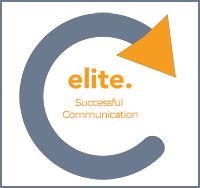Successful Communication
Code: ETSCOM
Duration: 1 Day
Delivery methods: Classroom, Virtual Learning, Onsite Event
Price per delegate: $425.00


The ability to communicate is an essential part of everyday life. Successful communication however is a skill that can be developed and fine-tuned so that your message is understood. This course will provide you with the tools and techniques to help you to develop these communication skills so that you create and leave a positive lasting impression.
Primarily aimed at people working in technical teams but is suitable for anyone who wants to develop effective communication skills.
Instructor-led, group-paced, classroom-delivery learning model with structured hands-on activities.
By the end of this training, you should be better able to:
We start the day by exploring the different ways that we communicate and examining the process of communication.
We then move on to define assertiveness what it is and what it isn't. This leads us into thinking about the passive and aggressive behaviors that people can exhibit. This will ensure everyone has a common understanding of each of the behavior types.
Definitions are all very well but what do these behaviors look and sound like? We use this opportunity to explore the non-verbal and verbal aspects associated with passive, aggressive, and assertive behaviors and how we often react when we come up against them. This allows us to start developing strategies for ensuring we behave assertively.
In this session, we explore some of the specific elements of verbal communication, such as questioning and listening skills and building rapport.
Effective feedback is also an essential skill. It is a skill however that is notoriously poorly done for a variety of reasons. Here we look at examples of poor feedback and use these examples to develop good practice for giving feedback constructively not destructively.
Building on the assertive skills, we provide you with a model for asking others what you want, without groveling and without making demands. This is a practical tool that can be used in both work and personal situations. You then have an opportunity to practice these tools and skills in a safe environment.
When communicating, we often find it can go wrong or find ourselves having to hold challenging and difficult conversations. How do you tell someone that they need to improve their performance and still keep them motivated? We discuss how and why communication goes wrong and what we can do to prevent it from happening. We provide you with a structure that you can use to help you to plan, prepare and hold a difficult conversation and do it effectively.
Written communication is a key part of any technical team's remit. We look at the impression poor written communication can make and then develop strategies for ensuring your emails and letters create a positive and lasting impression (for the right reasons!) We end this session by giving you the chance to draft a response to a complex or challenging email you have received.
We round the day off with the development of your action plans that you can take back to the workplace and start to implement.